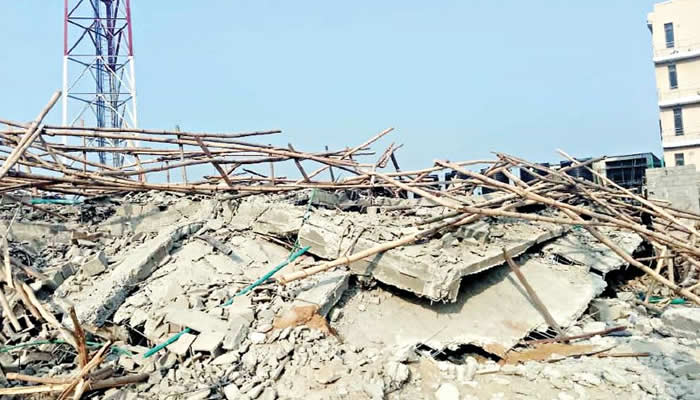The Imperative of Collaboration and Adherence to Standards in Curbing Building Collapse in Nigeria
The Nigerian Institution of Builders in Facilities Management (NIBIFM) has issued a clarion call for a concerted effort among stakeholders in the construction industry to address the recurring issue of building collapse in Nigeria. The institution emphasizes the crucial roles of structural engineers, construction consultants, architects, and quantity surveyors, urging them to collaborate effectively throughout the project lifecycle. Central to their appeal is the strict adherence to building codes and regulations, coupled with the engagement of qualified and certified professionals at every stage of the construction process. This multi-pronged approach aims to elevate construction standards and ensure the safety and durability of buildings across the country.
At the heart of the NIBIFM’s advocacy is the recognition that building collapse stems from a confluence of factors, most notably the engagement of unqualified contractors and the use of substandard materials. These practices compromise the structural integrity of buildings, rendering them vulnerable to collapse, often with tragic consequences. The institution’s chairman, Akpatre Ndaw, emphasized this point during the 4th Facilities Managers Conference in Abakaliki, themed “FM Revolution in Nigeria: Stakeholders’ Role.” He underscored the need for a paradigm shift in the construction industry, advocating for a culture of professionalism, accountability, and adherence to established standards.
The Crucial Role of Facilities Management in Enhancing Building Lifespan
Beyond construction practices, the NIBIFM stresses the vital role of facilities management in maintaining the long-term viability and safety of buildings. Ndaw highlighted that proper and regular facilities management is essential to preserving the structural integrity of buildings and preventing premature deterioration. He argued that once a structure is completed, ongoing management and maintenance are paramount to ensuring its longevity and preventing potential hazards. This proactive approach to building maintenance, according to Ndaw, is a critical component of minimizing the risk of building collapse and ensuring the safety of occupants.
The conference also served as a platform to discuss the evolving landscape of facilities management in Nigeria. Ndaw noted the significant transformation of the sector, driven by factors such as rapid urbanization, technological advancements, and changing workplace dynamics. He projected substantial growth in the Nigerian facilities management market, forecasting a compound annual growth rate of 12% from 2020 to 2025, with the market size expected to reach N1.3 trillion by 2025, a significant increase from N700 billion in 2020. This growth reflects the increasing demand for outsourced facilities management services and the growing recognition of its importance in optimizing building performance and lifespan.
Technological Advancements and the Future of Facilities Management
Ndaw further highlighted the increasing adoption of advanced technologies in the facilities management sector, including Building Information Modeling (BIM) and Internet of Things (IoT) devices. These technologies are revolutionizing the industry, enabling enhanced operational efficiency, real-time monitoring of building systems, and proactive maintenance strategies. He noted that a significant proportion of Nigerian organizations are planning to invest in these technologies, recognizing their potential to transform facilities management practices and improve building performance.
The NIBIFM emphasizes the shared responsibility of various stakeholders in creating a conducive environment for effective facilities management. Government agencies, professional bodies, and facilities managers all play crucial roles in this endeavor. The government is expected to formulate and implement policies and regulations that promote best practices in facilities management, while professional bodies play a critical role in setting standards, providing training and certification, and advocating for the advancement of the profession. Facilities managers, on the other hand, are responsible for implementing best practices, utilizing available technologies, and ensuring the optimal performance and longevity of the buildings under their management.
The Call for Collaborative Action and the Path to a Facilities Management Revolution
The President of the Nigerian Institute of Building (NIOB), Alderton Ewan, echoed the NIBIFM’s call for collaborative action, stressing the importance of stakeholder engagement in driving a true facilities management revolution in Nigeria. He noted the significant evolution of facilities management in the past two decades, from an emerging discipline to an indispensable component of the building and infrastructure lifecycle. Ewan emphasized the need for decisive and collaborative action from all stakeholders, including government and regulatory authorities, to achieve a transformative change in the industry. This collaborative approach, he argued, is essential to ensuring the safety, sustainability, and optimal performance of buildings and infrastructure across the country. He highlighted the importance of the chosen theme for the 2025 conference, emphasizing its timeliness and relevance in addressing the challenges and opportunities within Nigeria’s built environment. The NIOB’s focus on fostering collaboration and promoting best practices in facilities management underscores the industry’s commitment to ensuring the long-term viability and safety of buildings in Nigeria. This commitment reflects a broader recognition that facilities management is not merely a cost center, but a strategic investment that contributes significantly to the economic and social well-being of the nation.


